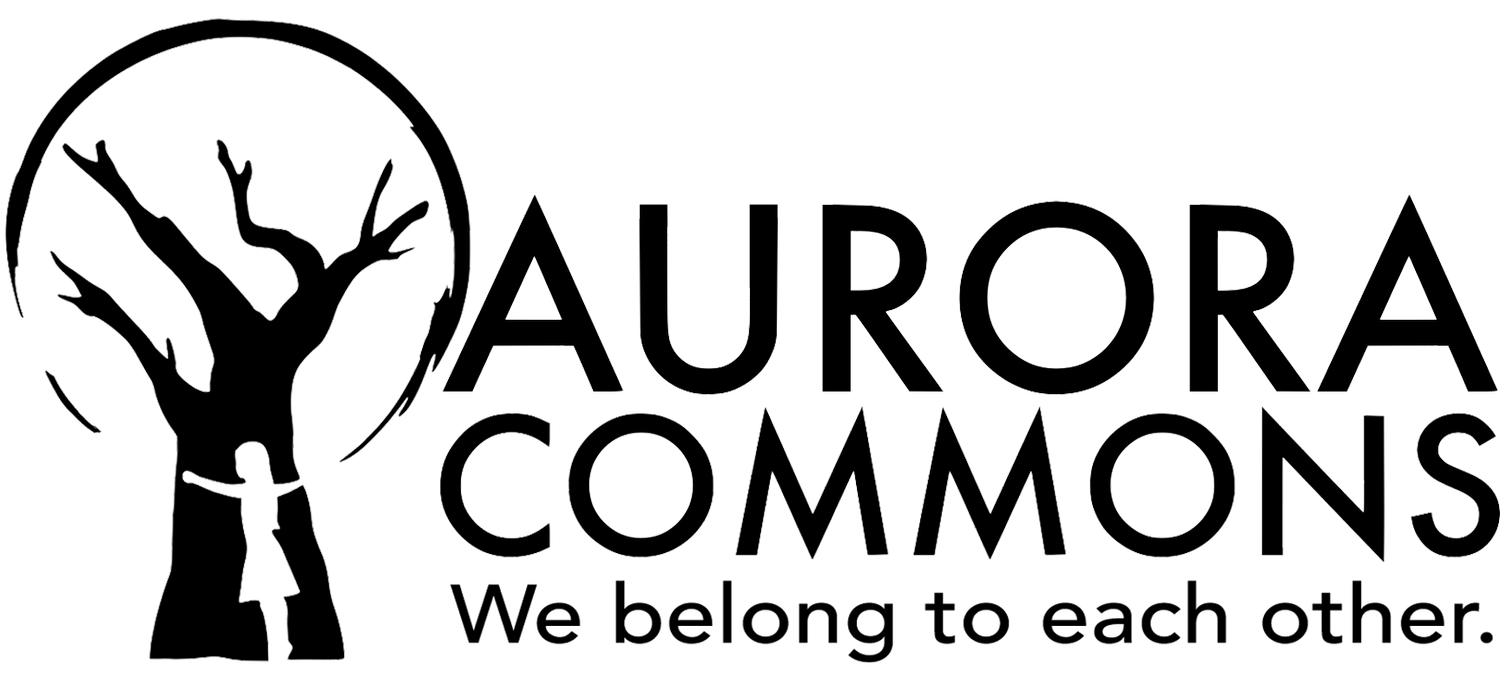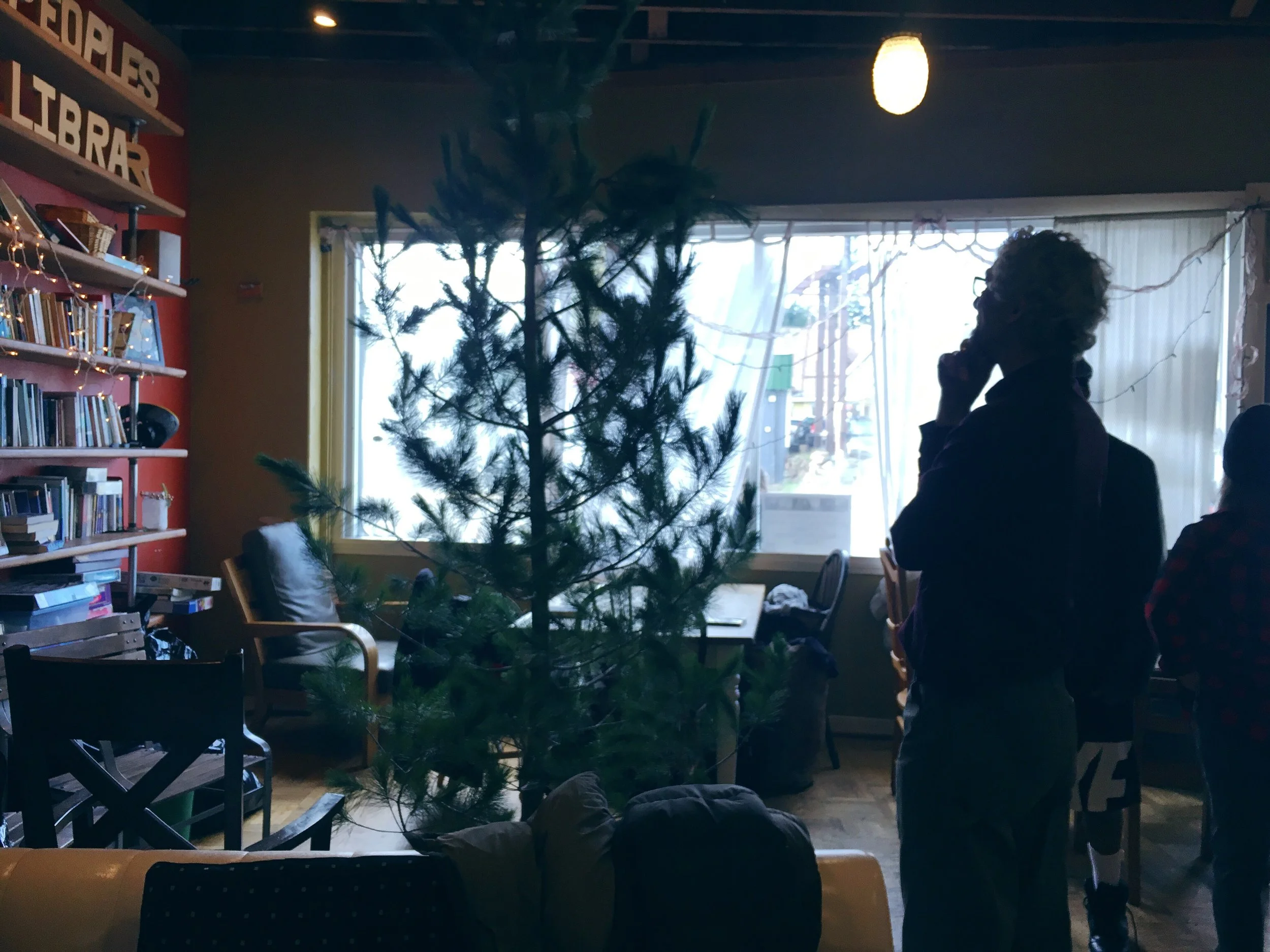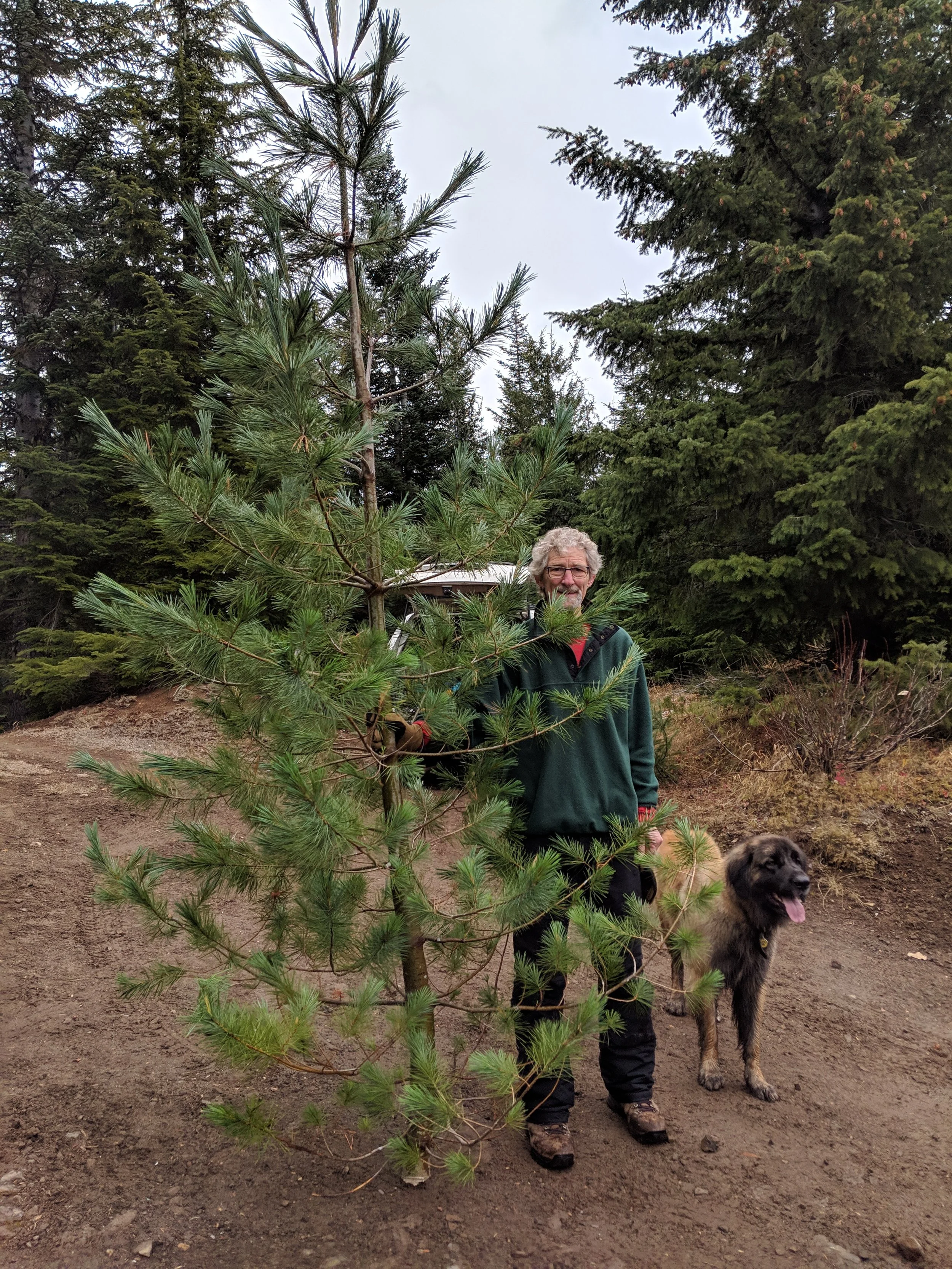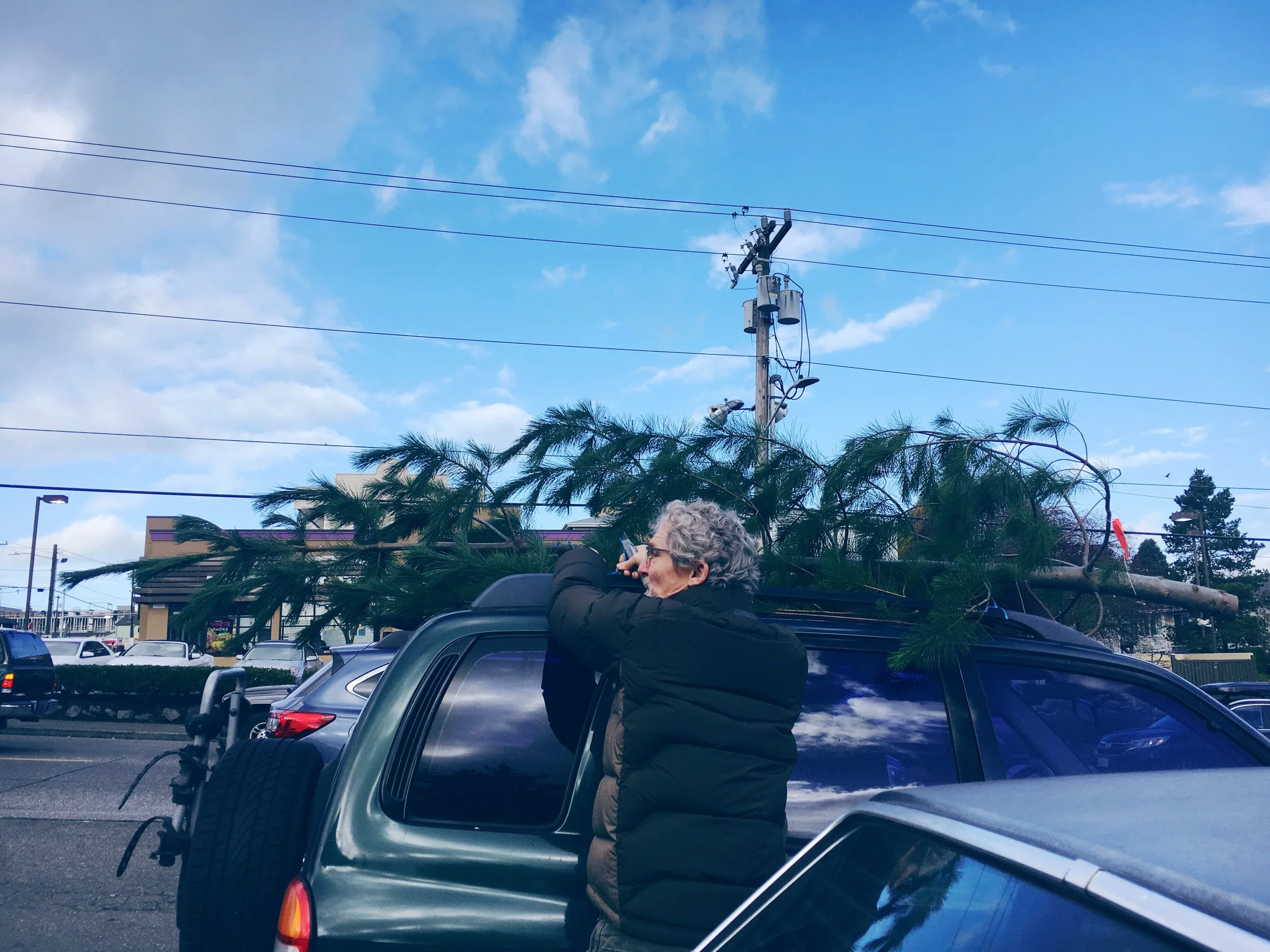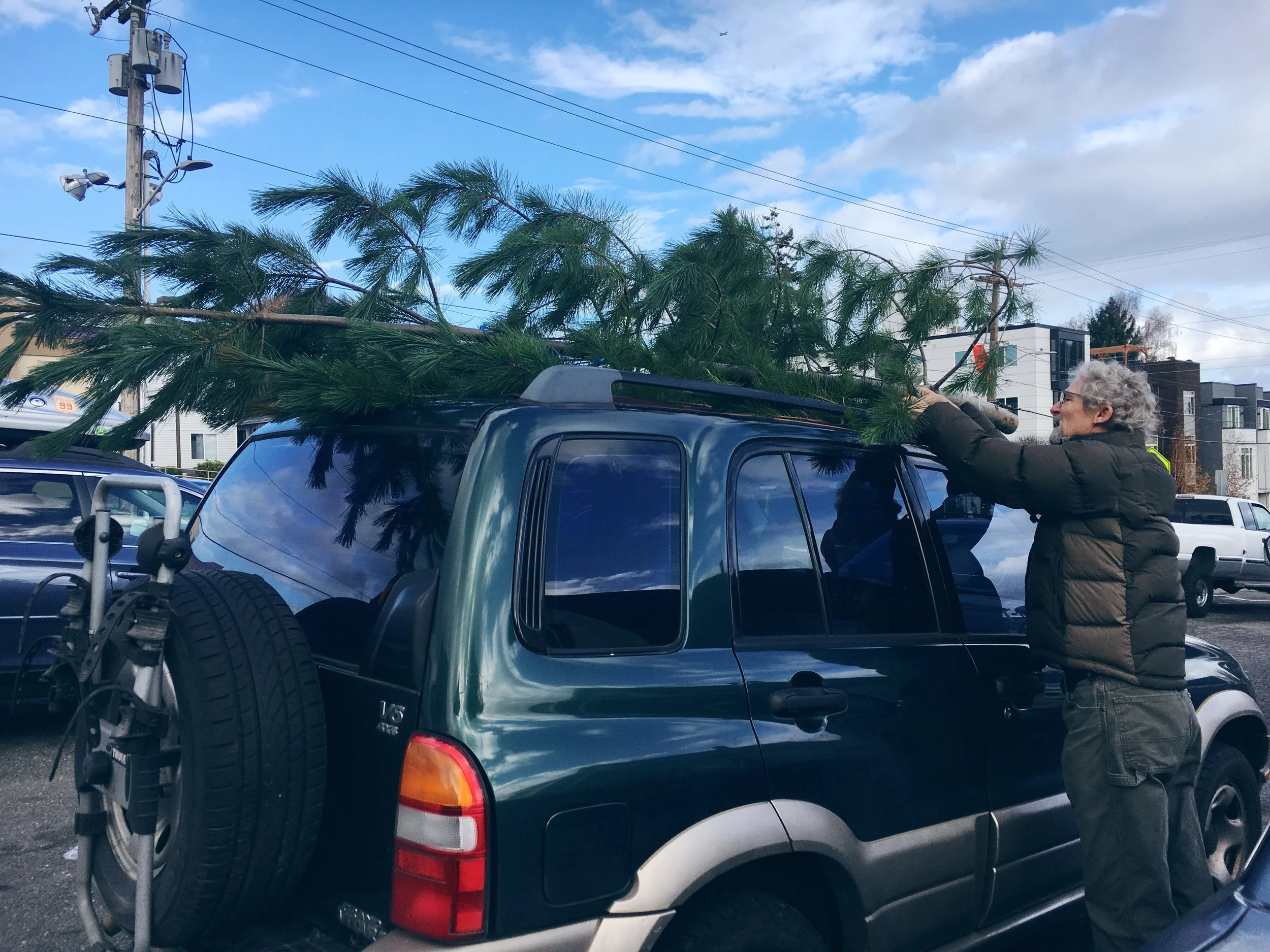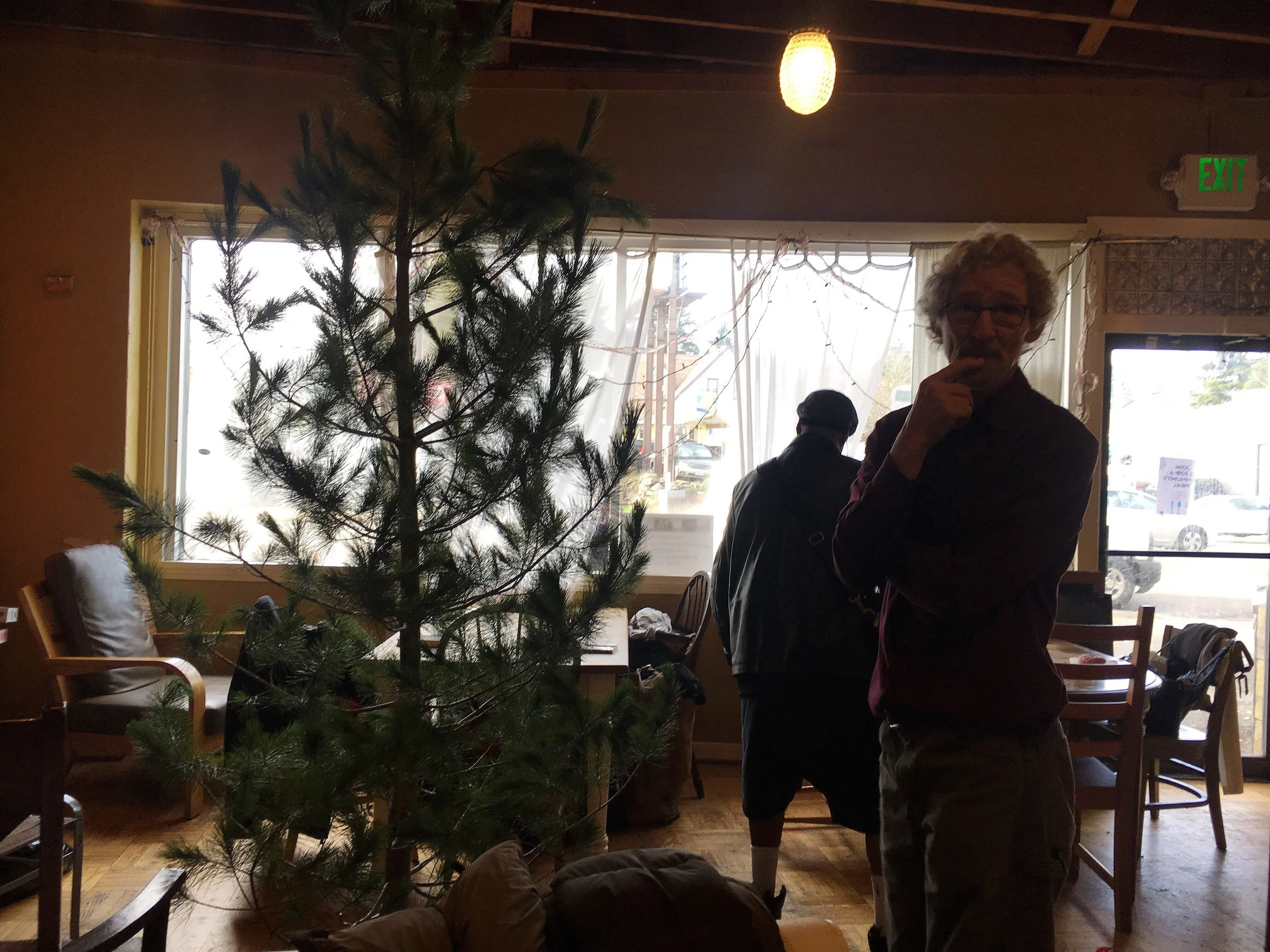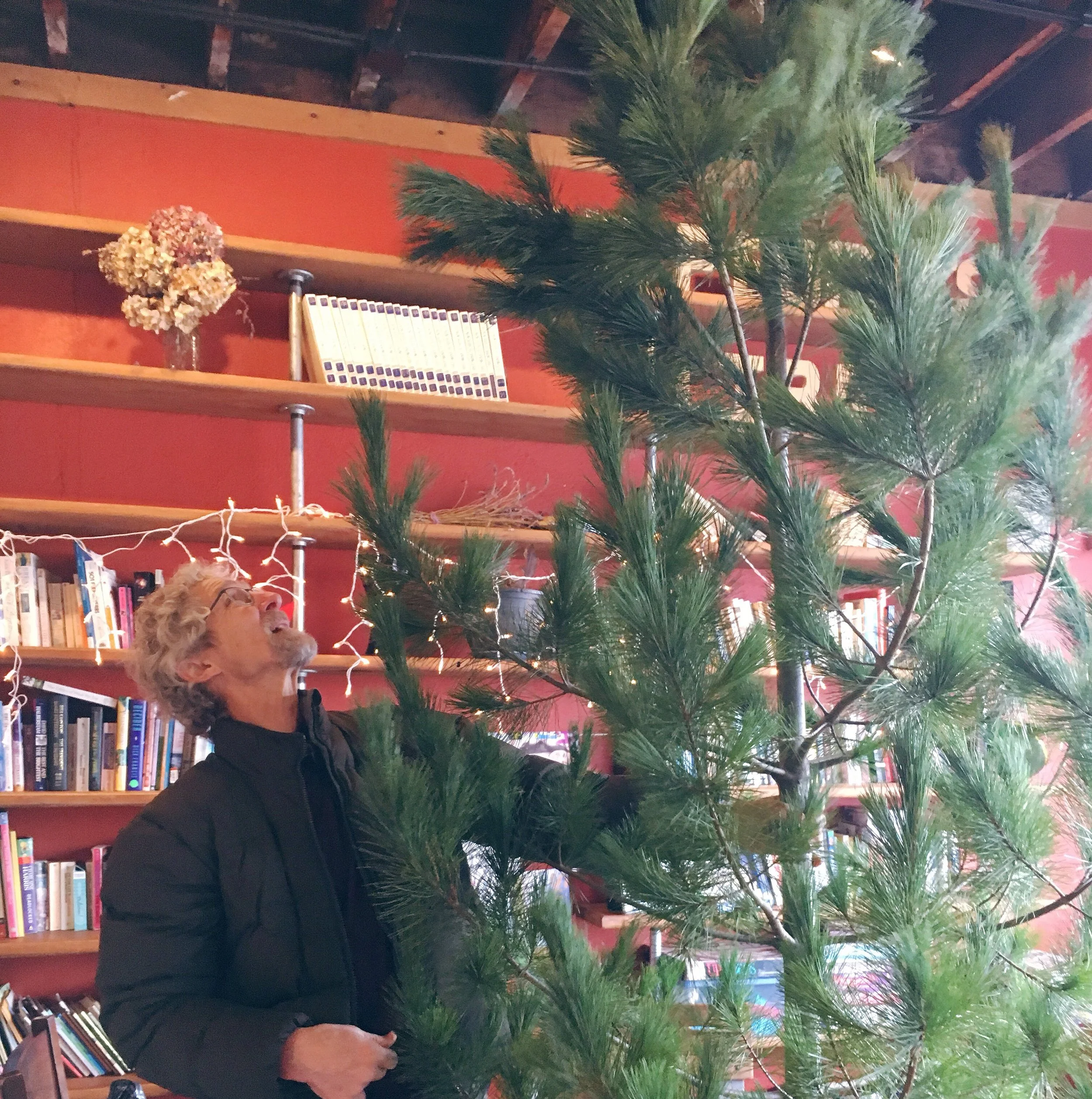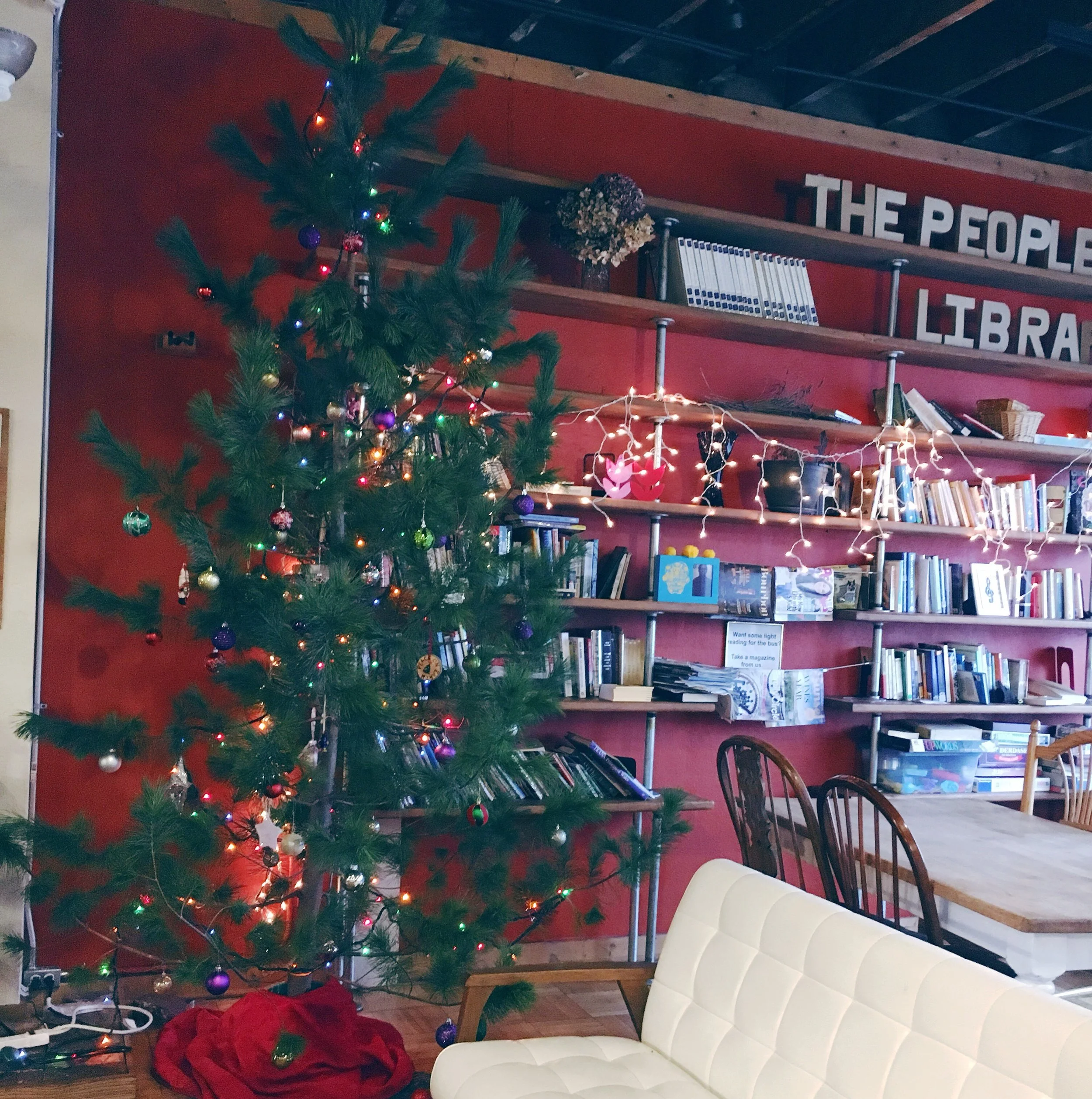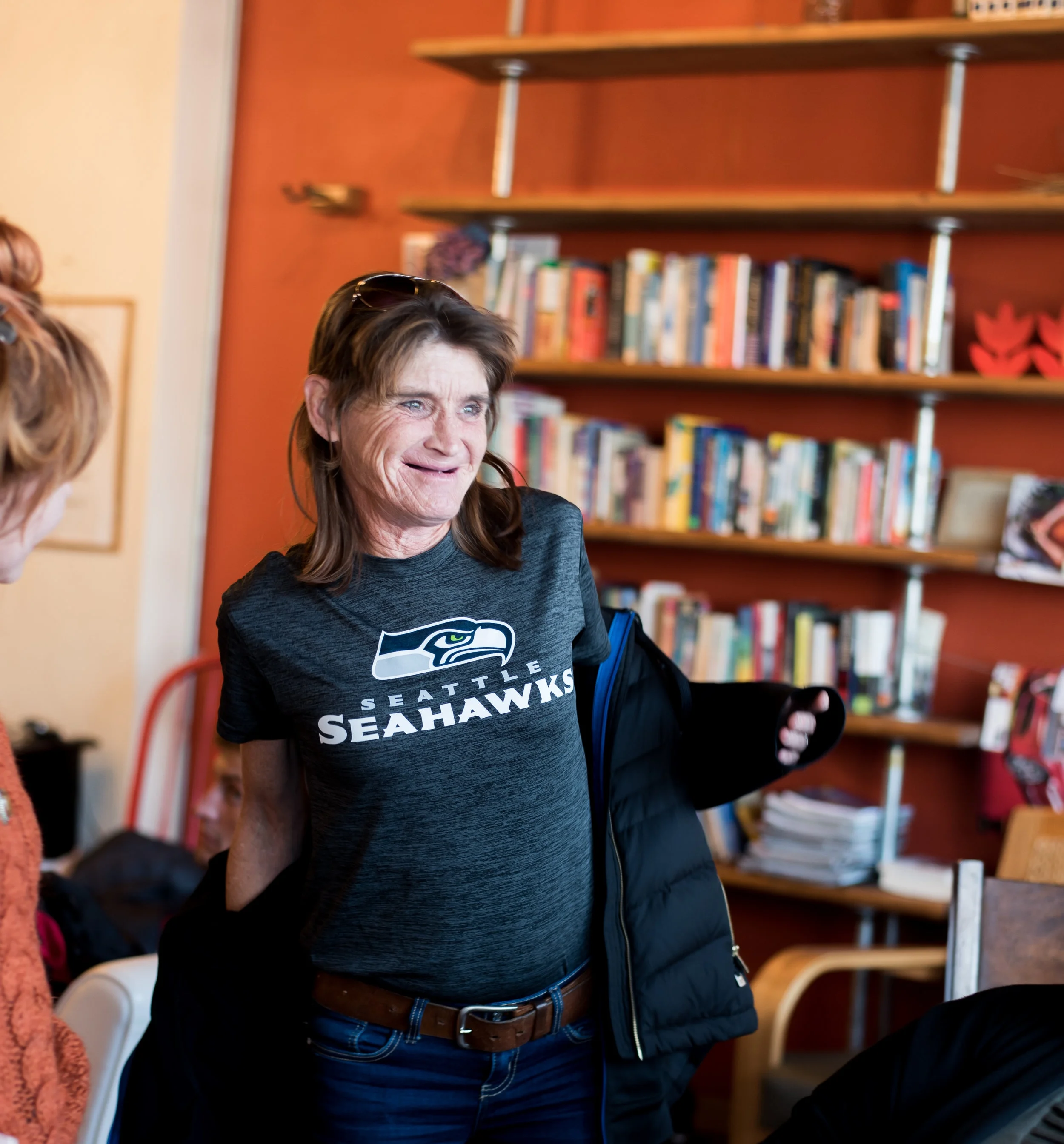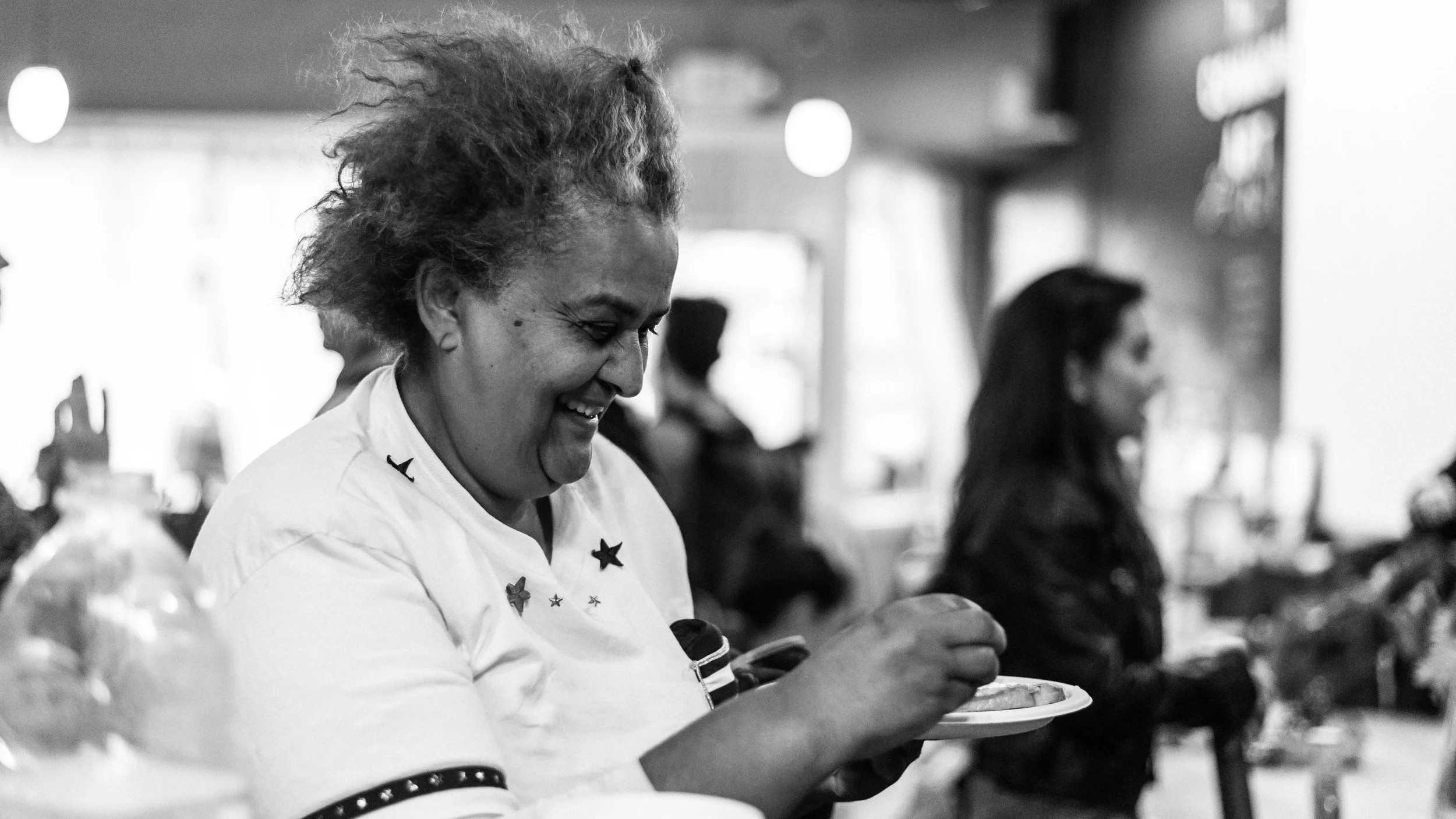
AURORA COMMONS BLOG
A Tree All Dressed up—The Outrageous Extravagance of Love
I always ask around the Commons if we should decorate for the holidays. It’s a shared space—our communal home and those twinkling lights can sometimes feel like a strobe light illuminating our most painful losses. “It is hard” a friend tells me, “It is hard and can make it worse, but it might be worse to not decorate, to ignore the crappy feelings, to pretend its not happening. So yeah, lets put some lights up”. So yeah, the lights go up and the most special of all is that someone brings us a tree, a really special tree—teaching us about the outrageous extravagance of love.
We decorate for Christmas. Lights. Tinsel. Wreaths. A Santa here and there. A vintage nativity scene. A tree—a really special tree.
John, Daphne, and the tree.
The holidays can be a painful time. Those daily losses and griefs and angers and regrets haunt us, rising up to confront us with what we have lost, what we have broken, and how we have ourselves been wounded. Those wounds which don’t ever quite seem to heal tend to fester this time of year, reminding us in pinpricking pain that they are still there, itching for healing—some relief, please, just some relief. The holidays can bring us face to face with the promises we have dropped, the vigils we could not keep, the desires which never came to fruition, the dreams which dropping were shattered into unrecognizable pieces.
The actual cut
I always ask around the Commons if we should decorate for the holidays. It’s a shared space—our communal home and those twinkling lights can sometimes feel like a strobe light illuminating our most painful losses. “It is hard” a friend tells me, “it is hard and can make it worse, but it might be worse to not decorate, to ignore the crappy feelings, to pretend its not happening. So yeah, lets put some lights up”.
John’s wife, Karin and the her dog Poppy, and of course, the tree.
So yeah, the lights go up and Santa comes out and we look for the lost baby Jesus from the nativity for a very long time. And the tree—we get a really special tree.
Our volunteer John comes every Tuesday. He comes to sit and talk, mostly, to the old-timers as he calls them, an old-timer himself he would say. His enthusiasm and joy and energy in all the things we shudder away from: plunging toilets and sinks and sweeping and mopping, makes him seem like the youngest person in the room, and yet also the wisest—as he leads with listening, always placing himself as a student before all those whom he encounters. John comes and he sweeps and then he mops and these floors which bear a lot of weight and bags and heavy footsteps and rain water and dirt are bathed in loving care and attention. He attends to the floors like to a person needing someone to sit up with them through the night. He gets the corners and under the rugs. He is also the only one in our space who waters the plants, and during this time of the year, he goes out and he gets us a tree.
He goes out, family in tow, and wrangles us a tree. It’s almost enough to give us the hope required to make it to the next day, and the next, and the next, and even maybe the next one after that.
These acts of giving, small and steady, are the gifts of putting oxygen back in the room. These gifts allow for the moment to actually breathe, a moment of space enough to finally allow the room for the ribs to expand. We were made to expand, growing outward, and yet the daily disappointments, traumas, illness, and wounds wrap us up tightly within ourselves, clenching the fists in on themselves, arms wrapping around in protection. A tree is just a tree and yet gratitude and the work of gratitude, which is the work of giving, makes the tree more than just a tree—it puts some oxygen back in the lungs and we can breathe for a moment, daring maybe to let the lungs and voice and mind and body sing for a moment.
Since we put our tree up, since we dressed it in lights and bobbles and tinsel and care—people have been singing more, you might not even believe it, but it’s true. I hear it, softly and under the breath, those little tunes of jingles and joy and childhood memories and fond tunes.
A tree all dressed up for a party — it’s so silly isn’t it? So grand and excessive and without it how would we survive? Of course we don’t need a Christmas tree to survive. But, also, in a way we do, for as we look past that long pitch across the void of survival these silly items of beauty and excess and grace in twinkling lights are what allow for our humanity to remain intact, allow for us to retain ourselves after we have survived, storing up the beauty we desire deep within, like rations we nibble on to sustain the long trek of survival.
John gets us a tree.
Picks it out just for us.
It’s the beautiful excess of this love that undoes us.
It’s the extravagant love of this attention to us and for us which gives us more than a tree, gives us the gift of beauty, which is the gift of the hope and radical courage to survive.
Right now, we got some oxygen back in the room and we find a bit of space to let our ribs expand.
Right now, at least for a few moments,
that little bit of room means
we start to hum,
start to reach our hand out,
start to grieve our losses,
we start to look for ways to help,
and miracle of miracles,
for a couple seconds
we might even find ourselves singing
—such beautiful excess,
such needed grace
—oxygen and hope and a dressed up tree.
Thankfulness and Pain — a reflection on grief and gratitude, for you, from the Aurora Commons on Thanksgiving Day
On this day of thanksgiving we often gather, often around food, around the idea of gratitude. Thanksgiving often prompts the question of “what are you thankful for?” Asked over and over this question often feels trite and we can answer it easily without much thought. Being at the Aurora Commons what I learn is that gratitude isn’t a location as much as it is a journey, and an arduous one at that.
“This week at the Aurora Commons I learned I had been wrong about Gratitude all along.”
You can listen to this letter here and if you would prefer to read it, the full text is down below.
“What Myrna teaches us is that you don’t get thankfulness without pain and pain when felt, inevitably and surprisingly always brings us into gratitude. ”
Our dear Myrna
On this day of thanksgiving we often gather, often around food, around the idea of gratitude. Thanksgiving often prompts the question of “what are you thankful for?” Asked over and over this question often feels trite and we can answer it easily without much thought. Being at the Aurora Commons what I learn is that gratitude isn’t a location as much as it is a journey, an arduous one, the journey I most do not want to take, the journey I most need to take, the journey without a destination, the journey which hurts. I learn that gratitude is only learned and not something to be acquired, it’s a moving target, a mystic guide you don’t quite trust, an exacting coach pushing you farther than you physically thought you could go.
Yesterday at the Commons I ask our friend Myrna what she is thankful for. I admit the question is a clique one but she pays that no mind and quickly answers,
“I am thankful for good health and good friends.”
It is the almost banality of her response which catches me, it’s a response one hears all the time, I am thankful for good health and good friends—as if it is only a mere gesture. Our words so often ring hollow. Our words so often are merely glib phrases which underneath ring of a persistent and knocking void. A void which haunts us a bit, climbing up through our words—those vacant building blocks, of “I’m, good, how are you?” — “I’m fine!” — “It’s okay” — “You too” …
Myrna’s response of “I am thankful for good health and good friends” is a common answer this time of year, one many give. We tend to default into essentializing those who lived unhoused by what they do not have, defining them by their lack and thus I expect her answer to be different somehow. I expect somehow for her answer to reveal her pain, her plight, her dire situation, but no, her answer reveals what I might have lost hope in, that maybe we truly still can define community by what we share, by gratitude, by our simple yet profound belief that our humanity in common is enough to bind us together.
“It’s the small blessings you weren’t counting on.” Myrna says and as she says this Don asks her what size she wears,
“Small.” she answers.
“Perfect,” he says as out from behind the bookshelf he pulls a pair of leather slippers he had been saving for her.
“See?” She says to me as she holds out her new slippers. And yes, for a moment I do see.
“I am thankful for good health and good friends”
The boldness of Myrna’s gratitude is shocking, as in knowing her you would know she is on her first day out of respite care after a rocky recovering from lung cancer. “Over ninety-three stitches!” she tells me, 93 stitches to close up her side where she had a lung taken out. Before the lung cancer there was some more cancer, pneumonia, illness upon sickness building and piling up and upon one another. As for friends, she has lost a lot of them lately, with a handful having died in cruel and tragic ways. Without good health and in the midst of the painful loss of some dear friends Myrna looks me in the eyes and steadily and assuredly and non ironically tells me she is “thankful for good health and good friends.”
What Myrna teaches us is that you don’t get thankfulness without pain and pain when felt, inevitably and surprisingly always brings us into gratitude. It is a difficult lesson to learn and a lesson we often spend lifetimes avoiding. When we speak about pain we also are speaking of the ways and tools we use to alleviate our pain, to numb, to ease, to dull the ache. It is a bit more transparent to see how those who are living on the streets and who are living drug dependent are working to numb the overwhelming amount of pain in their lives. For those of us living housed, the ways we numb are sometimes a bit trickier to spot and since the more socially acceptable dependancies we have come alongside some privilege, they can remain quite a bit more camouflaged. But that often hiding vice-like grip on our tools to numb our pain is also the space where our journey through pain and into gratitude and back again begins. We all have our dependancies which numb and sooth that ache and yet as we know when we numb the pain we end up, in happenstance form, numbing thankfulness too. Without this pain we cut off the access route to gratitude, a route which is always in detour, always in flux. Gratitude is an agile climber and we can only and barely try to keep up, but like any good climb it is the work which makes it worth it.
Gratitude follows pain and what Myrna teaches us is the bravery of leading with this gratitude. As she wades through her loss, she allows gratitude to be her guide. Often we experience gratitude only afterwards, but she, well, she leads with it. Without good health and before even receiving a taste of it she states unequivocally that she is grateful for it. Who could have such courage? I tend to only be thankful after I have bargained and worked and pleaded to get what I want and what I most want is often that which will allow me to escape my own pain. Can we be as brave as she, stepping into our pain and allowing it to bring us into the wild country of gratitude? Will we allow our loss and despair to teach us what true thankfulness is? Will we allow the work of gratitude to do its work in us?—the work of revealing to us our pain, pain—which we as a humanity share. This practice of gratitude is disguised within the practice of grief and hunched over our tears, head heavy in our hands, like a steady drumbeat in the distance getting nearer and nearer, approaching the rhythm of our own heartbeat is that wild horse gratitude approaching.
It is a clique Myrna tells me, that question of what are you thankful for, “but it’s a good clique” she says.
“I am thankful for good health and good friends.”
So I ask you now as I asked Myrna, What are you thankful for? How do we reach past the glibness into the real meat of thankfulness and come back scrubbed raw and open by the pain of gratitude? If you allow yourself, the way Myrna did, to touch that tender spot of your own pain you will find as well that reservoir of gratitude. Will we be brave enough to try? The “what are you thankful for?” question is a lot like the question of “what have you lost?” and we often cannot bear to ask, to look, to peak into those depths. Gratitude is a painful place and real gratitude requires we wrestle with those familiar demons lurking around our corners—the haunting of loss, the pain of love and the burden of hope—all these apparitions of grief. Gratitude, if we can truly get our hands on it, will feel like a tender pain—the kind of pain which allows us to wake up and notice, to notice what is around us and what around us isn’t just us and our own pain—but others and their own unique mix of thankfulness and loss—and this is the gift, so bite into it, hold onto it—like a bullet in the teeth, like a leather belt you bite onto to withstand the pain—for this is what gratitude is. If we are able to follow gratitude up that mountain of pain we might have the gift of seeing Myrna up there, just ahead of us, turning back and smiling, leading the way, all the while telling us how thankful she is for her good health and her good friends.
So today, on this sweet day, wherever you may be and whatever you have lost and whatever you may receive today, I wish for you, good health and good friends.
"We Cannot Respond to Hate With Hate" - A Speech by Elizabeth Dahl, Executive Director
“The American dream is so often an exclusive dream, a dream offered to people who start further ahead in the race. You have read this before but the concept of pulling yourself up by your bootstraps is only possible if you’re wearing boots.”
Just two nights after we lost a beloved member of our community to a senseless, violent act the Aurora Commons hosted it’s annual benefit. It was a painful time for our community, but also a gift to be in such amazing company. After the loss of Danny, Elizabeth re-wrote her speech and delivered these words to those in attendance.
“We Cannot Respond to Hate with Hate” - By Elizabeth Dahl
I recently hosted a pastor at the Commons who was visiting from Rwanda named Moses. He is one of very few who survived a 100 day genocide in his country that killed 70% of the Tutsi population. I shared our story with him. How Aurora Commons was born out of a neighborhood response through Awake Church to share life, to share resources, and to build relationships with all neighbors in the area, not just the ones who are housed. I told him how last year alone, we welcomed over 8,000 visits from our unhoused community. After I shared, I asked if he had any questions. He sat quietly and looked around. “I have one question,” he said finally. “In my country we have a view that people in America don’t suffer. This is not something that your media captures. My question is, how can you, with such affluence, allow your people to suffer so deeply?”
Moses’ question has rung in my ears, with such affluence, how can we allow this suffering?
“If we have no peace, it is because we have forgotten that we belong to each other.” With this statement, Mother Teresa has simply yet profoundly asked us to turn towards one another. We have forgotten that we belong to one another when we want the people experiencing homelessness in our neighborhoods to be homeless somewhere else. We have forgotten that we belong to one another when we look at people who use drugs with judgement, disdain, and hate. We have forgotten that we belong to one another when we think that women who are commercially exploited on Aurora should be in jail instead of told they are worthy of love just as they are, that you are worthy. We cannot have peace without facing and embracing our most marginalized people and making every effort not to just ease the suffering of those around us but to address it. We live in a country that has had tremendous affluence, but affluence breeds complacency. The American dream is so often an exclusive dream, a dream offered to people who start further ahead in the race. You have read this before but the concept of pulling yourself up by your bootstraps is only possible if you’re wearing boots.
On Thursday, October 25th, a young man named Daniel Alberto was shot in the heart at point blank range on the street behind the Commons. I was there less than 30 feet away when he was killed and watched as his lifeless body was compressed over and over by the emergency response team. Within minutes of the shot, I received two hateful emails from neighbors along Nesbit blaming Aurora Commons for bringing gun violence into the neighborhood. I received another email the next morning. Within hours social media, blogs, and news stations, filled with hateful rhetoric blaming places like Licton Springs Village and Aurora Commons, asking people to rally to cut our funding and spewing some of the most hateful things one can read.
Danny needed help. He found in Aurora Commons a safe haven. He suffered from untreated mental illness. His soul was kind and it was in profound moments of believing in his goodness that we saw who he really was. The police officers saw his kindness too and were rooting for him. Danny was recently successfully bridged to LEAD North, the officers communicated they believed he was a good man and that he had a chance. Danny needed help, he needed community, he needed anyone to believe that he wasn’t beyond hoping for. “The man who called the police to say he shot a man in the Licton Springs neighborhood of North Seattle Thursday night claimed the victim was a neighborhood nuisance, known for trespassing, using drugs, and damaging property in the area” (Lynsi Burton, SeattlePI Updated 4:46 pm PDT, Friday, October 26, 2018).
Danny was killed by a housed neighbor who called him a nuisance. He was killed by a man who was so blinded by his own story and hatred, that he could not see Danny as a person who deserved to live, as a person who needed help, as a person who was worthy of love. He was killed by the same kind of hatred that sent me those emails. He was killed by the same hatred that refuses to believe that we are ALL responsible for the people in our community. With such affluence we cannot allow this suffering.
Aurora Commons was started as a neighborhood response to the disparity we found in our neighborhood. As neighbors located on Nesbit, we opened in our neighborhood because people were suffering and had no where to belong, no where to charge their phone, no where to make breakfast, to get a coat, to use the bathroom, to be bridged to resources, to be remembered when they were gone, or sick, or celebrating a birthday.
We must confront our privilege, our bias, and our complacency. We must reach towards our unhoused neighbors with compassion. We must make sacrifices in this affluent city to address the crisis we’re facing. The common thread of humanity binds us all together. Everything can change if we don’t just believe we belong to each other, but that we live as though we belong to each other. That dignity, beauty, strength, and worth is inherent in every person, and that together, we can do better, we must do better. Our action cannot end with a singular instance of easing suffering or sharing resources, we must make sacrifices, we must cast-off the pressing charge of upward mobility.
We have a responsibility to educate, to teach, to be patient, to love our enemies, to continue to stand up for people who are being mistreated. We cannot respond to hate with hate. It is hate the took Danny’s life. Our path forward is peace.
“Our path forward is peace”
Karen Cirulli Farewell
A message from Karen Cirulli, Co-founder of Aurora Commons
In a couple of weeks, I will be stepping out of my role as the Director of Community Engagement in order to build and pursue the part of me that is a massage therapist. I have been a massage therapist for 12 years and it is finally time to bring this to the forefront of my vocation. This transition in my life feels right and ripe with possibilities. Although I am taking a significant step back, I will still have a small handful of hours per month with the Commons in a supportive role.
I could not feel more confident in the hands that will take over my position as Director of Community Engagement. Marge Long is an exceptional woman not only with an immense amount of experience (she is over-qualified for the job!) but she embodies the philosophies of Aurora Commons. She is wise, humble and loving with a healthy dose of that east coast fieriness. I am truly excited for you to meet her. This is a huge change and it felt appropriate for me to say some words of reflection as I move on:
Dear Aurora Ave and Aurora Commons Community,
Nearly a decade ago I turned to you because you felt vaguely familiar causing my curiosity to be peaked. There was a draw toward you that I couldn't quite explain except I knew you would change me. Then, inevitably, under the stream of constant headlights, I fell in love with you and together we built a home.
You have shaped me in ways that have challenged ALL that I have known. You have been brutally honest by being yourself while inviting me to be myself. You have accepted me and let me into the sacred corners of your stories, into your motel rooms, your wheeled homes, your tents and under your awnings. You have invited me to your births and I have stood with you weeping at death. You fight hard to live and survive, you are stronger then I will ever be.
You have taught me and will continue to teach me how to hold extremes and let go of absolutes. This community of humans, all of you who enter the Commons, you enter knowing you are a part of something bigger. You are teaching this city how to BE WITH ONE ANOTHER regardless of status. THAT is this miracle, THAT is the magic that continues to draw me back to you. Although I am taking a very significant step back, you will remain my teacher and my heart. You will thrive, you will continue to challenge me and cause us all to wrestle with our own humanity while defying stereotypes and stigma. These words include everyone who participates in this community in any way - I hope you know how powerful you are. You are shaking your fist in the face of dehumanization. By participating you are changing the tide of disempowerment, you are revolutionaries.
Marge Long, Incoming Director of Community Engagement
I humbly accept the position of Director of Community Engagement at Aurora Commons with great anticipation and gratitude for the opportunity to be a part of this work and team. I refuse to accept the notion of stepping into shoes I could not, should not, nor would attempt to fill. I come into this sacred space bringing all of my humanity, with my few smoothed out edges and mostly my jagged edges in the hopes I will connect to other’s humanity. I have walked in the shoes many of our neighbors are in. I have been in recovery from drug abuse for over twenty-six years; I have been homeless and sold my body to feed my addictions. My hope is in the truth that we are all human, we are all in need of being loved, seen, and known for who we are and not what we do and that every human being is equally valuable. I believe these truths are what will enable me to step into this position with an attitude of acceptance, equality, and love. I am extremely grateful for the work Karen Cirulli has started and look forward to her continued guidance as I lean into all this next season holds. I have felt invited into this space with a warm an invigorating hug from all the leadership and staff and I am overjoyed to be a part of the goodness and the messiness that comes from being human together.
Chris Cerrato, "The Pain of Being a Man"
When I was asked to share my story, a lot of things flashed through my mind. "Wow, my community at the Commons thinks of me even when I’m out of sight?" Also, "they value my thoughts and feelings enough to ask me to share?"
Now let me tell you why I would be a tad taken aback by their request. I definitely haven’t always lived in what you would call the light, but I was always supported by people whom I am truly proud to call my friends at the Commons who never seemed to give up on me, no matter how dark my life had become, and even as I had begun to give up on myself. I had resigned myself to the fringes of society. I was a thief and in the throes of a deadly active addiction which has claimed many people that I care deeply for. However, no matter how dark things became I would show up at the Commons and I would be treated with respect, my opinions would be valued, and most importantly to me, I felt this overwhelming love.
Well, long story short, my life- (for lack of a more fitting word), caught up with me and I was sent to prison which didn’t help with the main problem that I had, which was how I felt about myself. So, I did my time, and when I was released, found my way back to drugs immediately, and so I spent some short stints in jail for probation violations: 30 days, 15 days, and so on, and the one thing that I feel I had during this time was that I was still accepted by my family at the commons and encouraged to keep fighting.
After one violation my Probation Officer Lillian, asked if I would like to try something different. She was talking about treatment. I was ready, really ready. A few weeks later, on a Monday, I received a bed date for Wednesday morning and I was told that this would most likely be my last opportunity as I’ve never really given Lillian an indication that I had any intention of getting clean before. I talked to Lisa about this on Tuesday at the Commons, her Karen and Jackie were so proud of me for taking this step and I felt myself that though I often thought about getting clean I had never moved it from my brain to my heart - I was even a little proud of myself even though I was still actively using. Well, here comes the scary part: I stayed up all night on Tuesday because I was afraid that if I slept, I would miss my Wednesday morning check-in for treatment. But, I guess I was so tired that I fell asleep early Wednesday morning, missing my transport to treatment and it was then that I really fell apart. I did not know my next move but I did know that the Commons was open, it was about 10 o'clock when I came in and made a cup of coffee.
I believe I always did a very good job of hiding the pain that I was in emotionally but when Lisa saw my face she read me like an open book, she knew something was wrong, and we began to discuss the situation. Lisa's suggestion was to get in touch with Lily and tell her what had happened, my suggestion was to not. But, I decided to make the call and got the voicemail. I was so overwhelmed- I decided to go outside to breath, have a smoke, think. Unbeknownst to me while I was outside Lily called back and somehow Lisa was able to get across to Lily but I was really ready and willing to try something different, ready for treatment and to give me another chance. While her and Lily were talking on the phone the police had seen me, knowing of my Probation Violation- they had pulled up to the Commons and I was taken into custody. Lisa ran out just as I was pulling away...
Thinking I was going to return to prison, I began to mentally prepare myself for the long road ahead. After a few weeks in prison, I got a visit from Lily explaining that I would in fact be afforded another chance. And also that the main reason for this opportunity was because of the support I received from the people I love and respect of Aurora Commons. Presently, I am five months clean, working as a painter and managing a clean and sober living facility and I owe a lot of this to the Commons- I would really like to convey this. There is a quote from author Hunter S Thompson and it goes, "he who makes a beast of himself gets rid of the pain of being a man" and I thought that very profound when I read it, but I think the flipside to that is "a good man gets rid of the pain of being a beast” that’s a lot more fitting of how I want to live my life and how our friends at the Commons do. Thank you.
Chris Cerrato
Chris shared his story at the Aurora Commons benefit, Aurora Means Dawn in October 2017. He is starting a business painting houses inside, outside, and commercial. We're so excited for him. "Commercial and residential painting, no job too small! Interior, exterior, staining, detailed, color matching, woodwork & more. Fair Pricing, Call Chris: 253-733-9781. "
Bodies of Being -- A Day at Aurora Commons Watching Football
On a Sunny Sunday at the Commons last fall we set up the tv to watch the Seahawks football game. We lost but this matters only in the way all things matter — if one believes that sort of thing, myself? I scrutinize moments analyzing them for their worthiness. Moments calling for only our gratitude for their simplicity and joy I tout as lazy and look for something to dissect, to work out, to clean. But these moments pass like the breeze and surely they won’t come back.
In the moments asking for enjoyment I look for a clock to punch in — there must be a job needing worked, something somewhere needing to be mended. I escape the presence of being into a hell I create for myself. At the Commons there is always work to be done, dishes to be washed and like a heavily used home there is always laundry or sweeping to do, while the work of encircling our lives around one another often goes untouched. Sometimes I sweep up spilled crackers in order to avoid having to sit in the uncertainty, pain, anguish of another human being. Sometimes I turn away from the mess of broken hearts in order to put in a load of laundry. We are needy beings with never enough time to be met, I know this. Someone within arms reach is most assuredly hungry and must be fed. Yes, and yet humanity begs for moments of being, of pleasure, of delight, of being listened to. I often miss the real work at hand of belonging to one another and drown out my own loneliness and incapacity in chores and work and the busyness of attending to needs.
The Commons jolts me out of my chores and holds me fiercely in the face of the other. There is surely someone within arm's reach who needs the feel of pleasure, of the well-timed joke, of the squeeze to the shoulder full of affection. There is always work to be done, yes, but there is yet even more pressing the lonely human needing to be seen. I learn this poignantly on a summer evening as we sit together watching a football game. Jeremiah, a Commons volunteer, sits across the table passing conversation back and forth as easily as waves dance with the shore. People sink into couches and soft chairs as we drink coke and eat pizza and laugh at car commercials, yelling at the screen — pleasure simple as breath, as bread, as a need met. We all fall into delight and friendship and dare I even say love, despite the score on the screen not falling in our favor.
These bodies of being teach me. Andy who sleeps in a park tells me, “People forget that being able to sit on a couch and watch football makes you feel like you are a human, and I want to feel that again”. So we sit on soft places as the coke we drink bubbles up with something akin to hope and we find pleasure is not only for the privileged, the rich, but for the body of us all, even if it is just for a Sunday afternoon.
